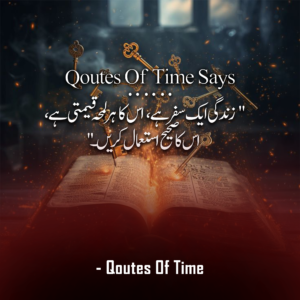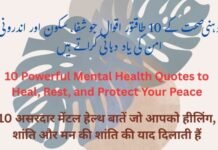
“زندگی ایک سفر ہے، اس کا ہر لمحہ قیمتی ہے، اس کا صحیح استعمال کریں۔”
“Life is a journey, every moment of it is precious, make the most of it.”
To read more “Life Quotes” Click here.
Introduction: The Depth of a Simple Truth
The quote, “Life is a journey, every moment of it is precious, make the most of it. Here, you don’t receive comfort without purpose; people wander around with minds in their hearts,” offers a powerful yet gentle reminder of what it means to live fully and consciously. It encourages mindfulness, purpose-driven living, and emotional awareness—all essential components of a morally rich and meaningful life.
Though poetic in tone, the quote is layered with philosophical insights. It explores time, purpose, emotional depth, and the unseen moral framework guiding human experience. Let’s unfold this line by line and uncover its lessons.
Life as a Journey: Embrace the Long Road
“Life is a journey” is a metaphor that has stood the test of time. It speaks to the idea that life is not a fixed destination, but a constantly evolving experience—a road full of twists, turns, detours, and unexpected scenery. We are all travelers, each on our own path, facing challenges, celebrating joys, and learning along the way.
Understanding life as a journey teaches patience. It reminds us that no moment, whether joyful or painful, is permanent. Every step, every stage, and every experience contributes to the overall adventure of existence. We start to value the process as much as the results when we adopt this mindset.
Every Moment is Precious: The Call to Mindfulness
The second line—“every moment of it is precious”—is a direct invitation to live with awareness. Time is the most democratic of all resources; we all receive it in equal measure, moment by moment. But not everyone treats it with equal value. Too often, we lose ourselves in distractions, regrets, or anxieties, forgetting the uniqueness of the present.
To say every moment is precious is to affirm that life’s true richness lies in the now—not in the memories of the past or the dreams of the future. It encourages us to be present with those we love, to savor small joys, to learn from difficult moments, and to live each day as if it has meaning.
Make the Most of It: Responsibility in Living
“Make the most of it” shifts the focus from reflection to action. Life’s value doesn’t only lie in its preciousness, but in what we do with it. This phrase is a moral call—to live intentionally, to grow, to love deeply, to forgive quickly, and to contribute meaningfully to the world.
Making the most of life doesn’t mean being constantly busy or successful in the eyes of others. It means using your time, energy, and heart wisely. It means living in alignment with your values, honoring your responsibilities, and taking the risks needed to evolve into your best self.
Purpose Over Pleasure: No Comfort Without Meaning
The next line—“Here, you don’t receive comfort without purpose”—adds a deeper moral layer to the message. In life, true comfort—emotional peace, deep rest, or lasting joy—doesn’t come by accident or indulgence. It comes after effort, integrity, or the pursuit of something meaningful.
This quote doesn’t deny us peace; it teaches us that real comfort is earned, not granted. There’s a vast difference between temporary relief and lasting fulfillment. The former can be found in distractions; the latter is only found through living with purpose—helping others, working with honesty, or staying faithful during hard times.
The Hollow Nature of Comfort Without Effort
Many people today chase comfort without attaching it to purpose. They seek rest without labor, praise without discipline, or joy without growth. This quote warns against that mindset. It tells us that comfort is noble only when it follows courage and commitment.
True rest, for instance, feels most rewarding after a day of meaningful work. Love feels deepest when it follows vulnerability and trust. Success tastes sweeter when it comes through ethical effort. Thus, this line teaches a fundamental moral truth: comfort becomes real when it is the fruit of purpose-driven action.
Minds in Hearts: The Emotional Compass
The final line—“people wander around with minds in their hearts”—is a poetic depiction of humanity’s emotional depth. It suggests that our thoughts are not purely logical or intellectual. They are often guided by feelings, values, and emotional truths. We think, yes—but we feel as we think. Our decisions are shaped by experience, empathy, and memory.
This phrase honors the complexity of human nature. It affirms that emotional wisdom is as important as intellectual intelligence. A person may be educated and rational, yet if they lack emotional awareness, they may struggle to live morally. On the other hand, someone who leads with both mind and heart brings balance, compassion, and ethical insight to their choices.
The Beauty and Struggle of Wandering
The image of people “wandering” implies a search—sometimes lost, sometimes curious, sometimes longing. We all wander in life, through phases, doubts, and rediscoveries. But when our minds are in our hearts, even our wandering has purpose and direction.
This line encourages self-exploration. It suggests that to live morally, we must listen to our inner voice, reflect deeply, and act from a place of emotional truth. The heart becomes not only a seat of love, but also of conscience and clarity. When the mind lives in the heart, we make decisions that feel right and do good. To read more…CLICK HERE
Moral Summary: Living a Life That Matters
Together, this quote gives us a map for meaningful living:
- See life as a journey, not a checklist.
- Cherish every moment, because time is finite.
- Take full responsibility for how you live.
- Know that real peace only comes through purposeful action.
- Let your heart inform your thoughts and your thoughts refine your heart.
This is a quote not just to be read, but to be lived. It invites us to slow down, wake up, and live with depth and clarity.
Final Reflection: The Quiet Wisdom of a Moral Life
“Life is a journey, every moment of it is precious, make the most of it. Here, you don’t receive comfort without purpose; people wander around with minds in their hearts.”
These words serve as a mirror, reflecting the kind of life we are living versus the kind of life we are called to live. Are we present in each moment? Are we chasing comfort or building it with purpose? Are we making decisions that honor both logic and love?
When we begin to answer these questions honestly, we step into a life that is not only full—but morally beautiful. We stop rushing and start living, not just for ourselves, but with an awareness of our responsibility to the world.
To read more…CLICK HERE





